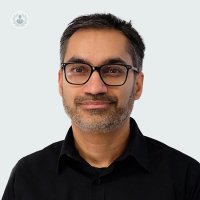A complete guide to breast cancer
Written by:In his latest online article, highly-experienced consultant medical oncologist Dr Jay Naik explains breast cancer in detail. Dr Naik explains how breast cancer is diagnosed, the different types of breast cancer and the different treatments available.

Can breast cancer advance to a stage where it cannot be treated?
There is a distinction between treatable and curable. If breast cancer is caught early, and there is just a lump in the breast or the glands in the arm, we can generally cure the cancer. This is typically done with surgery and additional treatments like chemotherapy.
There are different types of breast cancer, and the behaviour of these cancers and the corresponding treatments are different. It is extremely important for the patient to understand what is happening, and to ask any questions they have and come to a decision with the team looking after them.
How quickly does breast cancer spread?
This depends on the type of cancer. One of the things we look at is the grade of the cancer. A higher-grade cancer such as a grade 3 cancer, will spread more quickly than a lower-grade cancer. We also check proteins on the surface of the cancer. This includes oestrogen receptors, the protein that senses oestrogen (the female hormone). Another protein that can indicate cancer is HER2.
Some breast cancers have none of the proteins that usually indicate cancer. These are known as triple-negative cancers. Triple-negative cancers generally spread faster, along with HER2-positive cancers. However, each cancer is different and the speed at which it spreads depends on many different factors.
One of these factors is how quickly the cancer is diagnosed. The longer you leave a breast lump, or the more long you wait after noticing your first symptoms the more likely it is for the cancer to spread. If you notice a change, you should go see a doctor straight away.

What are the different types of treatment for breast cancer?
There are many different treatments available for breast cancer, and the number of treatments is constantly increasing.
Most people will be familiar with chemotherapy, which is the traditional cancer treatment. This treatment can make the patient tired, sick, and sometimes lose their hair. It has an important role in the treatment of all types of breast cancer. As we have got to understand breast cancer better, we have a better idea of how to treat it. We know that blocking hormones can work quite well as a treatment for oestrogen receptor-positive cancer. There are tablets available now that can block the production of hormones, specifically the action of the oestrogen hormone.
Lots of the treatments for HER2-positive cancer are based on proteins or antibodies, which are specific to that HER2 protein. These drugs usually come as an infusion, or sometimes as an injection.
For triple-negative breast cancers, we can now use immunotherapy. These are drugs that stimulate the immune system to fight the cancer. Cancer can hide from the immune system, or switch the immune system off. However, these drugs are quite clever, and wake the immune system up and help it recognise the cancer as something that shouldn’t be there, and helps the body fight the cancer.
This has been approved for advanced breast cancer, when the cancer has spread beyond the breast. It has recently been approved by the NHS for use as a pre-operative treatment as well. This is a big advancement, as historically this type of breast cancer had fewer treatment options.
What is the first step in breast cancer treatment?
The first step is assessment. If you find a breast lump, you should see a specialist who will assess you. They will do a mammogram or ultrasound scan to check the nature of the lump. They may also take a biopsy, which is a needle sample. They may also check the armpit as well, to see if the glands are affected.
If it is an early, localised breast cancer, you might go one to have surgery. Increasingly, we give some chemotherapy or targeted treatment pre-operatively, before the surgery. This would be a discussion between you, your surgeon and your oncologist.
If you have had breast cancer in the past, and it has reappeared in another part of the body, or if you first notice the breast cancer and it’s in another part of the body, surgery generally doesn’t play an immediate role in the treatment.
The treatment will depend on the type of tumour, and the patient’s preference as well. We will have a conversation about the nature of the treatment, what the side effects are, how it’s given, and the aims of the treatment.
What is the best treatment for breast cancer?
The best treatment depends on the type of cancer. It is important to understand what type of cancer it is, and then look at the results of the assessment. We can then decide on the best treatment based on several different factors: where the cancer is, the size of the cancer, and the type of cancer.
Treatment is often best delivered by a team of specialists. This could include a surgeon, a medical oncologist, or a radiation oncologist.
Dr Jay Naik is an award-winning consultant medical oncologist based in Leeds. If you would like to book a consultation with Dr Naik, you can do so today via his Top Doctors profile.


